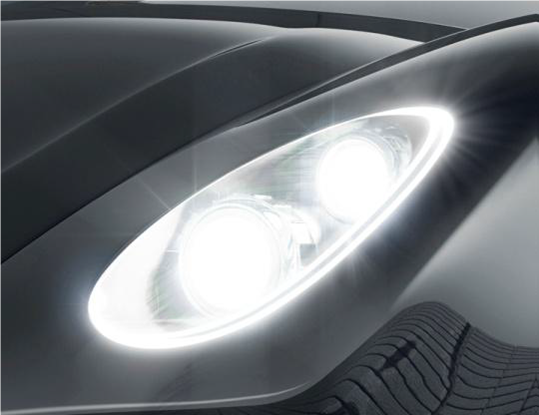German lighting manufacturer Osram has been a forerunner in automotive lighting, developing a lot of advanced automotive lighting applications including laser headlights for luxury car brands Audi and BMW, and OLED taillights for the BMW i8.
Louis Lam, CEO of OSRAM Opto Semiconductors Asia spoke to LEDinside about important automotive LED design elements, and outlook for laser, and OLED lighting designs in automobiles.
However, Lam declined to confirm whether Osram would supply OLED taillights to the upcoming BMW M2, citing confidentiality agreements prevented the company from “commenting on details of a specific program.”
 |
|
Louis Lam, CEO of OSRAM Opto Semiconductors Asia. (All photos courtesy of Osram) |
Q: Osram is well known in the industry for excellent automotive LED chip designs, which a lot of LED headlight makers have chosen. How is automotive lighting LED chip designs different from general lighting? What are some of the major difficulties in thermal dissipation design and reliability?
Lam: The LED design, including chip and package design, is a very sophisticated process which requires strong R&D capabilities Generally speaking, below several elements should be considered while designing the automotive lighting LED components:
-
The LED component should be qualified to automotive standards like IEC60810.
-
It should be usable for harsh and changing environment. LED must withstand both very low and very high temperatures (both outside and e.g. induced by motor etc.).
-
The applications in automotive are quite unpredictable, for instance, in which car and in which environment a LED will be used? We usually need to conceive and combine all of the worst case scenarios.
-
Weight reduction of cars is important for fuel efficiency, and heat-sinks must be minimized, so solid thermal design is vital.
-
Some LEDs require a minimum contrast ratio to ease the design of low beam and AFS functions, this needs to be considered in LED design.
-
Some functions are critical (e.g. stop light), so the production process must ensure highest processing standards and high density inspection steps.
-
Car is a highly complex system, and change management is vital, so any change must be carefully evaluated, if impaction fit, form, function or reliability.
-
The LED must have long-term availability – the long life cycle of cars and fact that most of today’s LED lighting systems there are without replaceable, standard light sources, a long-term availability of compatible LEDs must be ensured for a long time to ensure long-term availability of spare parts – LED manufacturing and logistics must be designed for task.
In addition, the increasing specialized functions in LED headlamps, for instance, the use of various, individual light sources allows nowadays for more flexible design styles as well as for advanced functions (good resolution glare free high beam), often requires a miniaturization while maintaining all the above quality requirements.
 |
|
Osram LEDs in automotive lighting applications. |
Q: Are more automotive lighting manufacturers using mid-power LED chips or does this depend on the type of automotive light they are designing?
Lam: This is application and design driven, in exterior it is a mix of mid and high power LED, in interior mostly low power LED
Q: How can you extend the lifetime and increase the brightness of OLED lights so it can meet automotive lighting requirements?
Lam: Brightness is already sufficient for taillight applications. Of course, more is always better. We have programs in place to improve the material performance with regard to efficiency and reliability.
 |
|
Lighting indicator applications in car wing mirrors. |
Q: When do you think OLED automotive lights will become mainstream?
Lam: For mainstream applications it is mandatory to become competitive in pricing, but also to introduce new features such as curved OLEDs. It still might take until the end of the decade.
Q: Will Osram also be developing laser headlights in the future? How many years before laser automotive lights becomes a mainstream product?
Lam: We are currently the only manufacturer whose laser module is deployed in series-production vehicles (BMW i8 and Audi R8 LMX) - which we are very pleased about. We believe that the future of illumination is versatile. There will certainly be more vehicles equipped with laser on the road – first of all, especially in the Premium-Section. Currently, laser technology is only at the beginning of its development and still has a huge potential - nevertheless, LED technology is certainly going to be the future’s standard solution.
Q: Will the next generation lighting technology in automotive lighting be laser or OLED? Or will it be a mix of LED, OLED, and laser?
Lam: We expect the evolvement of Laser and OLED in specific applications, they will all co-exist, a replacement of one over the over is not foreseeable
(Author: Judy Lin, Chief Editor, LEDinside)





 CN
TW
EN
CN
TW
EN








